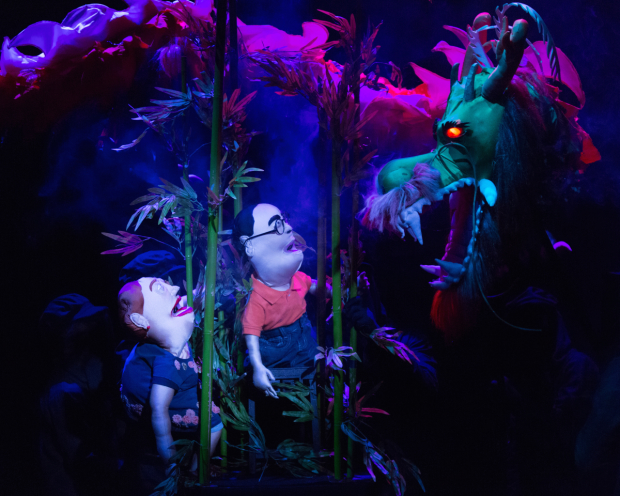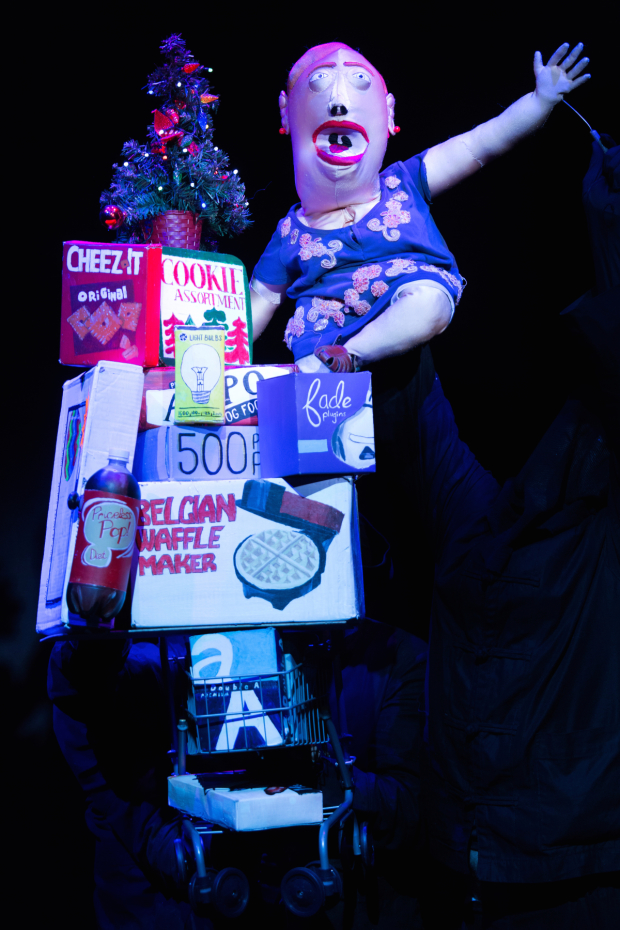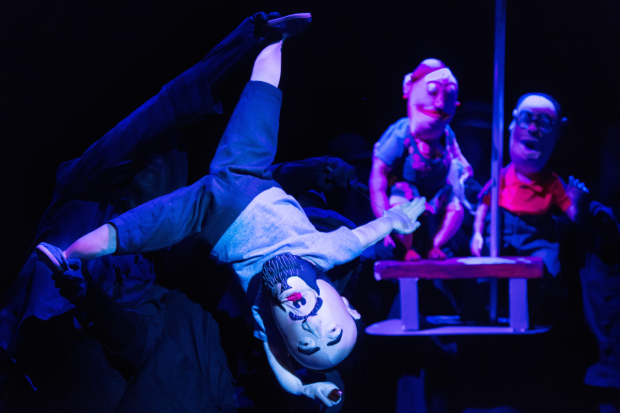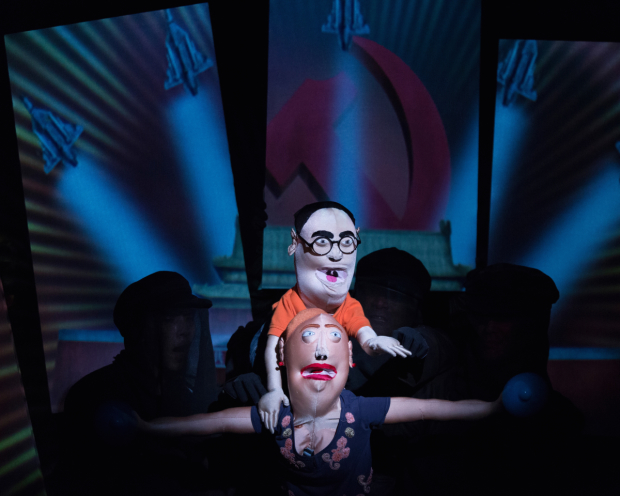Made in China

(© Heidi Bohnenkamp)
Mary sits on the couch completely nude and eating macaroni, which dribbles down her sagging breasts in the opening scene of Wakka Wakka's Made in China at 59E59. Mary is a puppet, but the stage picture is still repulsive, an amuse-bouche for the grotesque and fantastical feast served up by Wakka Wakka in this unlikely new musical. While some viewers will be turned off by the juvenile toilet humor that pervades the show (a Chinese plunger leads a chorus of personal products in the biggest production number), those who stay engaged will find a surprisingly thoughtful story about the rise of modern China and our relationship to it as American consumers.
Mary (Peter Russo) is a divorced grandmother from Ohio living with her dog, Lily (Dorothy James). Her next-door neighbor is Chinese immigrant Eddie Wang (Ariel Estrada), who also lives with his dog, Yo-Yo (Andy Manjuck). Mary goes on a shopping spree at her local big-box store in preparation for the holidays. While unpacking Christmas decorations, she finds a note from the imprisoned Chinese factory worker who made them, imploring her to contact a human rights organization. Mary doesn't know what to do with the letter, so she decides to flush it down the toilet. In the process, she is sucked into another dimension and finds herself on a magical and terrifying journey through China, accompanied by Eddie.

(© Heidi Bohnenkamp)
Despite the unorthodox subject matter, Made in China actually observes many of the conventions of a traditional book musical: Writers Gwendolyn Warnock and Kirjan Waage build their story around a romantic central thread, using the ensemble to establish the hyperbolic atmosphere of modern China. Composer and lyricist Yan Li captures the mania in the number "Every Fifteen Seconds," which contains the lyric, "carbon and plastic make China fantastic." Norwegian band MiNensemblet joins the composer and Max Mamon to form a small but hearty orchestra. Li writes a particularly lovely "I want" song for Mary: The contemplative piano runs and emotional yearning of the lyrics contrast wildly with the stage action, which shows Mary going through her bathroom routine.
Warnock and Waage (who also direct) thrive in such contradiction, which is perhaps why they have chosen China as a subject. The neatly packaged plastic objects that adorn most American households often betray a darker origin of overworked industrial workers performing menial tasks that are not always voluntary. But it's not as if most Americans, with our high cost of living and thin social safety net, really have an option to not work either. Wakka Wakka dives into this complicated issue through dueling puppets Mao (Charles Pang) and Uncle Sam (Stephen J. Mark).
Other scenes and characters don't feel nearly as thought-out: A mystical spirit guide named Wei Wei (designed to look like the dissident artist, Ai Weiwei) delivers the show's most incomprehensible song before disappearing completely. A subplot about the Tiananmen Square massacre seems shoehorned in. When the show goes off on such tangents, it feels like devised theater no one had the heart to edit (the Made in China Ensemble is credited as a cowriter).

(© Heidi Bohnenkamp)
Still, Warnock and Waage's caffeinated and rigorous staging mostly offsets the effects of the unshorn script. With the help of set designer Yu-Ting Lin, scenes flow with maximum efficiency, allowing this musical to travel around the world and back. Tiger Cai's video design adds a cinematic flair, augmenting the trippy experience of this already bizarre story.
The actors do the rest of the work: Russo is hilarious as Mary, but he also delivers a regretful monologue with committed sincerity so that we actually feel sympathy for the disgusting puppet. Estrada's Eddie is similarly vulnerable, but he plays his cards much closer to his chest. Lei-Lei Bavoil and Andy Manjuck give scene-stealing performances as Chinese tycoon Madame Millions and her American flunky, Richard MacMillions. The crazed way in which they evangelize about the Chinese economic miracle makes us suspect that they're flying high on more than just an 8 percent growth rate.
Waage has designed all the puppets to be highly specific yet durable (Mary and Eddie really take a beating over the course of 90 minutes). In a modern spin on Bunraku (a traditional Japanese style of puppetry), multiple puppeteers manipulate our characters, with one person entirely dedicated to feet (it is hilarious to watch them pad through thin air). A giant panda greets us during the overture, its head moving like an animatronic at EPCOT's China pavilion.

(© Heidi Bohnenkamp)
The tone of Made in China is so often derisive that it is difficult to tell when the creators are being sincere. Do they really think that we should be more conscious consumers? Or do they believe that in this system of globalized capital controlled by unfathomably wealthy and powerful interests, this is just a fruitless exercise in self-delusion? We walk away from the theater with a feeling of profound ambivalence, suspicious of the stuff in our apartments and wanting to know more.











